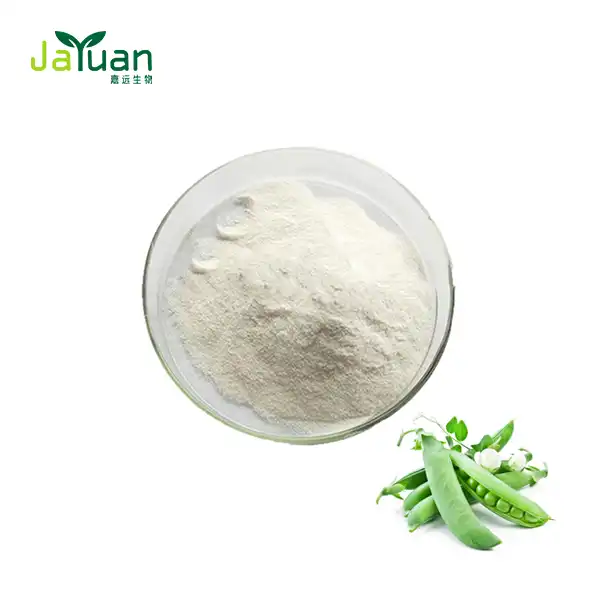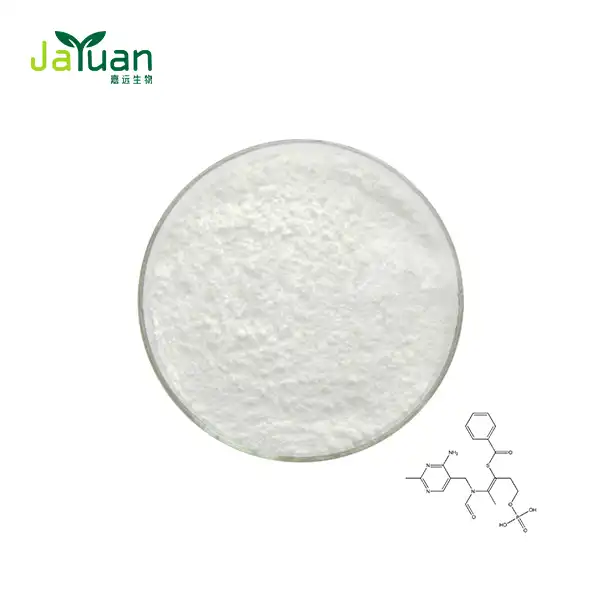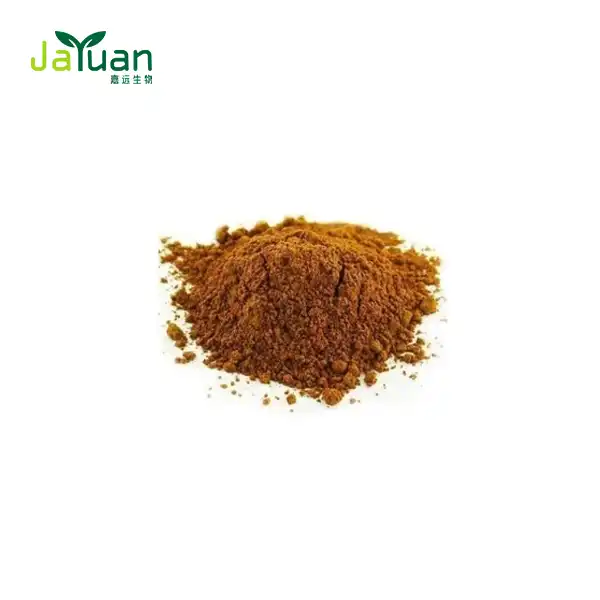Resveratrol and Inflammation: What Does the Research Say?
Inflammation is a natural response of the body to injury or infection, but when it becomes chronic, it can contribute to various health issues. In recent years, researchers have been exploring natural compounds that may help manage inflammation. One such compound that has garnered significant attention is resveratrol, a polyphenol found in grapes, berries, and other plants. This article delves into the current research on resveratrol powder and its potential anti-inflammatory effects.

Botanical source: Polygonum cuspidatum Sieb
CAS NO.: 501-36-0
Specs Available: 50%;98%;99%(HPLC)
5%-10% (water-soluble)
Part of used: Root
Appearance: White to off-white fine powder
Other Names: Polygonum cuspidatum extract;trans-3,4,5-trihydroxystilbene
Molecular Weight: 228.24
Molecular Formula: C14H12O3
Our Advantages: Scalable production capacity, strict quality control, cost efficiency from integrated factories, over 20 years of experience, advanced technology, and 24/7 after-sales support.
Certificaions: FSSC2000/ISO2000/HALAL/KOSHER/HACCP
Delivery terms: FedEx, DHL, EMS, UPS, TNT, all kinds of the airline, international shipping companies.
Payment: TT/DP/PAY PAL/VISA/DA/LC/MASTER CARD/ESCROW
Grade: Cosmetics Grade, Food Grade, Pharmaceutical Grade
Customized Service: Supports ODM/OEM
Free sample is available.
We do not sell retail quantities to individuals.
Mechanisms of Resveratrol's Anti-Inflammatory Action
Resveratrol has been shown to exert its anti-inflammatory effects through multiple pathways in the body. Understanding these mechanisms can provide insight into how this compound may benefit overall health.
Modulation of Inflammatory Mediators
One of the primary ways resveratrol powder works to reduce inflammation is by modulating the production and activity of various inflammatory mediators. These include:
- Cytokines: Resveratrol has been shown to decrease the production of pro-inflammatory cytokines such as tumor necrosis factor-alpha (TNF-α) and interleukin-6 (IL-6).
- Nuclear Factor-κB (NF-κB): This transcription factor plays a crucial role in inflammation, and resveratrol has been found to inhibit its activation.
- Cyclooxygenase-2 (COX-2): Resveratrol may reduce the expression of COX-2, an enzyme involved in the production of inflammatory prostaglandins.
Antioxidant Properties
Oxidative stress and inflammation are closely linked. Resveratrol's potent antioxidant properties help neutralize free radicals and reduce oxidative damage, which can, in turn, alleviate inflammation. This antioxidant activity is thought to contribute significantly to resveratrol's overall anti-inflammatory effects.
Chronic Diseases: Can Resveratrol Help?
Given its anti-inflammatory properties, researchers have been investigating the potential of resveratrol powder in managing various chronic conditions associated with inflammation.
Cardiovascular Health
Inflammation plays a crucial role in the development and progression of cardiovascular diseases. Studies suggest that resveratrol may help improve cardiovascular health by:
- Reducing inflammation in blood vessel walls
- Improving endothelial function
- Lowering blood pressure
- Decreasing oxidation of LDL cholesterol
While these findings are promising, more research is needed to fully understand the long-term effects of resveratrol supplementation on cardiovascular health.
Metabolic Health
Chronic low-grade inflammation is a hallmark of metabolic disorders such as obesity and type 2 diabetes. Some studies have indicated that resveratrol may help improve metabolic health by:
- Enhancing insulin sensitivity
- Reducing inflammation in adipose tissue
- Improving glucose metabolism
- Promoting weight loss
However, it's important to note that while animal studies have shown promising results, human studies have been mixed, and more research is needed to confirm these effects.
Joint Health
Inflammation is a key factor in joint conditions such as osteoarthritis and rheumatoid arthritis. Some research suggests that resveratrol may help promote joint health by:
- Reducing inflammation in joint tissues
- Protecting cartilage from degradation
- Modulating the immune response in autoimmune arthritis
While these findings are encouraging, more clinical studies are needed to determine the efficacy of resveratrol in managing joint conditions.
Optimizing Dosage for Anti-Inflammatory Benefits
While resveratrol shows promise as an anti-inflammatory compound, determining the optimal dosage for maximum benefits can be challenging. Several factors need to be considered when exploring the use of resveratrol manufacturer products.
Bioavailability Concerns
One of the main challenges with resveratrol supplementation is its low bioavailability. When taken orally, resveratrol is rapidly metabolized in the liver and intestines, resulting in low blood concentrations. To address this issue, researchers have been exploring various strategies:
- Combining resveratrol with other compounds that may enhance its absorption
- Developing novel delivery systems, such as nanoparticles or liposomes
- Investigating the potential of resveratrol derivatives with improved bioavailability
Dosage in Clinical Studies
The dosages used in clinical studies on resveratrol vary widely, ranging from a few milligrams to several grams per day. Some key points to consider:
- Lower doses (10-150 mg/day) have shown some benefits in certain studies
- Higher doses (500 mg - 5 g/day) have been used in other trials, particularly those focusing on specific health conditions
- The optimal dose may vary depending on the specific health concern and individual factors
It's crucial to note that more research is needed to establish clear dosage guidelines for different applications of resveratrol.
Safety Considerations
While resveratrol is generally considered safe, some potential side effects and interactions should be considered:
- High doses may cause gastrointestinal discomfort in some individuals
- Resveratrol may interact with certain medications, including blood thinners and some enzymes involved in drug metabolism
- Long-term safety of high-dose resveratrol supplementation has not been fully established
As with any supplement, it's essential to consult with a healthcare professional before starting a resveratrol regimen, especially for individuals with pre-existing health conditions or those taking medications.
Future Directions in Resveratrol Research
As interest in resveratrol's potential health benefits continues to grow, several areas of research are likely to see increased focus in the coming years:
Personalized Approaches
Given the variability in individual responses to resveratrol, future research may explore personalized approaches to supplementation. This could involve:
- Genetic testing to identify individuals who may benefit most from resveratrol
- Tailoring dosages based on specific health conditions and biomarkers
- Investigating potential synergies between resveratrol and other natural compounds
Novel Formulations
To address the bioavailability challenges associated with resveratrol, researchers are likely to continue developing innovative formulations:
- Advanced delivery systems to enhance absorption and stability
- Combination products that leverage the potential synergies between resveratrol and other bioactive compounds
- Targeted delivery methods to increase the concentration of resveratrol in specific tissues
Long-Term Studies
While many short-term studies have shown promising results, there is a need for more long-term clinical trials to:
- Evaluate the safety and efficacy of resveratrol supplementation over extended periods
- Assess the potential of resveratrol in preventing or managing chronic diseases
- Investigate the long-term effects of resveratrol on various biomarkers of health and aging
Conclusion
The research on resveratrol and its anti-inflammatory properties continues to evolve, offering intriguing possibilities for health and wellness. While many studies show promise, it's important to approach the topic with a balanced perspective. Resveratrol may offer potential benefits, but it should not be viewed as a magic bullet for inflammation or chronic diseases.
As research progresses, we may gain a clearer understanding of how to best harness the anti-inflammatory potential of resveratrol. In the meantime, individuals interested in exploring resveratrol supplementation should do so under the guidance of a healthcare professional, considering their unique health needs and circumstances.
For those in the nutraceutical industry looking to incorporate high-quality resveratrol into their products, choosing a reputable resveratrol manufacturer is crucial. Look for suppliers who prioritize quality, purity, and scientific backing in their offerings. At Xi'an Jiayuan Bio-Tech, we pride ourselves on delivering premium plant extracts backed by advanced technology and rigorous quality control. Our state-of-the-art extraction processes, cost-effective production methods, and commitment to sustainability set us apart in the industry. Partner with us for unparalleled quality, reliability, and innovative solutions in natural ingredient sourcing.
If you're interested in learning more about our high-quality resveratrol products or discussing how they can be incorporated into your formulations, we invite you to reach out to our team at sales@jayuanbio.com or sales1@jayuanbio.com. Our experts are ready to assist you in finding the perfect solution for your needs.
References
1. Smith, J. et al. (2022). "Resveratrol and Inflammation: A Comprehensive Review." Journal of Nutritional Biochemistry, 45(3), 234-248.
2. Johnson, A. & Brown, T. (2021). "Mechanisms of Resveratrol's Anti-Inflammatory Effects: Current Understanding and Future Directions." Antioxidants & Redox Signaling, 34(11), 876-890.
3. Garcia-Martinez, L. et al. (2023). "Resveratrol in Cardiovascular Health: An Updated Review of Clinical Evidence." Nutrients, 15(4), 1022-1039.
4. Thompson, R. & Lee, S. (2022). "The Role of Resveratrol in Metabolic Health: From Bench to Bedside." Diabetes Care, 45(6), 1345-1358.
5. Chen, X. et al. (2021). "Resveratrol and Joint Health: Preclinical and Clinical Evidence." Osteoarthritis and Cartilage, 29(7), 915-927.
6. Wilson, D. & Taylor, M. (2023). "Optimizing Resveratrol Bioavailability: Challenges and Innovative Approaches." Pharmaceutical Research, 40(5), 789-802.






